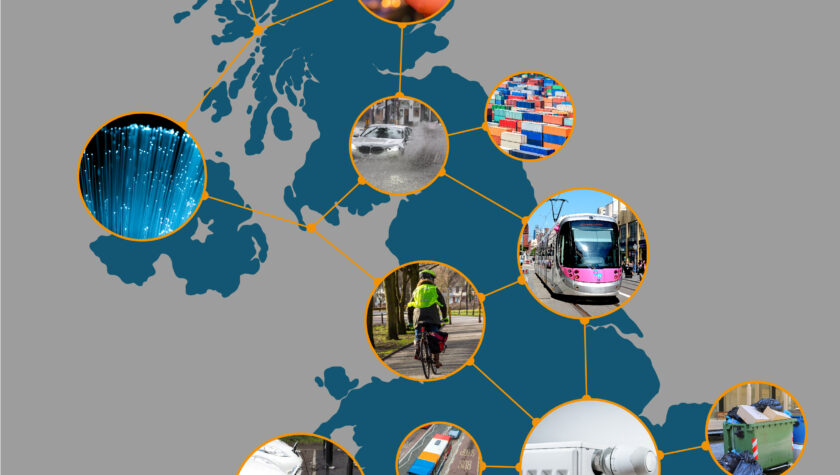Government must develop stronger staying power and focus on fewer, bigger, better targeted initiatives to deliver the infrastructure needed to meet its long term goals for economic growth and a lower carbon economy, the UK’s independent advisers on infrastructure have said.
The last year has seen progress towards major infrastructure objectives “stutter further just as the need for acceleration has heightened”, the National Infrastructure Commission says, warning that “in a range of areas government is off track to meet its targets and ambitions”.
The Commission’s annual Infrastructure Progress Review highlights positive progress towards nationwide coverage of gigabit broadband by 2030 and continued growth in renewable electricity, both of which it notes have enjoyed a relatively stable policy environment. The report meanwhile criticises “negligible advances in improving the energy efficiency of UK homes, the installation of low carbon heating solutions or securing a sustainable balance of water supply and demand,” which have been subject to a more short term and changeable approach in recent years.
The report points out that government has set an ambition for at least 600,000 heat pumps to be installed each year by 2028, while only 55,000 were fitted in 2021 – meanwhile, 1.5 million gas boilers were fitted. Similarly, government expects 300,000 public electric vehicle charge points to be in place by 2030; but only 37,000 public charge points are currently installed.
The Commission also calls for a “greater sense of certainty” around progressing HS2 and Northern Powerhouse Rail, stressing that delays inevitably push back the economic benefits for communities.
In its proposals for “getting back on track”, the Commission calls for:
- Policy staying power to deliver long term goals and reduce the uncertainty that adds cost for business and delays or deters investment;
- Fewer, but bigger and better interventions from central government, with tighter strategic focus on the areas it can make the most difference rather than “expending too much effort on many small scale funding interventions and repeated consultations, trying to maintain optionality in all areas”;
- Greater devolution of funding and decision making, moving away from competitive bidding processes and building on the multi year funding settlements for combined authorities with long term devolved budgets for all local transport authorities, while also allowing greater revenue raising powers at a local level;
- Unblocking delivery barriers, specifically the planning regime for nationally significant infrastructure projects, where updated National Policy Statements for key sectors are the first big step.
Drawing on the Commission’s past recommendations which have been accepted by government, the report identifies ten specific priorities for the year ahead, including an acceleration of home energy efficiency improvements – including tightening minimum standards in private rented sector homes – and faster roll out of electric vehicle public charge points. The Commission also highlights the need for government to urgently finalise proposals on water efficiency labelling and new building regulations within the year to help achieve the 110 litres per day consumption target by 2050.
The Commission credits government for continued investment in infrastructure in the short term – with a commitment of £100 billion to support economic infrastructure from 2022-23 to 2024-25 – but warns “private sector investment is also critical for meeting the government’s long term targets on infrastructure. The UK must remain an internationally competitive place to invest, at a time when the Inflation Reduction Act in the United States and the REPowerEU plan and the Net-Zero Industry Act in the European Union make the investment environment more challenging. Ambitious and stable policy from government, alongside effective regulation, is critical for providing the private sector with the certainty it needs to invest.”
The Commission will publish a review on how to accelerate the planning system for major infrastructure projects later this spring. This will be followed in the autumn by the second National Infrastructure Assessment, setting out costed recommendations on infrastructure priorities for the next 30 years.
The Commission’s top ten short term priorities for government – based on past recommendations accepted by ministers – are:
| Theme | Targeted action for the year ahead |
|---|---|
| Supporting growth across regions | Move away from competitive bidding processes to give local areas more flexibility and accountability over economic growth funds, and implement flexible, long term devolved budgets for all local transport authorities |
| Demonstrate staying power by progressing the Integrated Rail Plan for High Speed 2 and Northern Powerhouse Rail and remaining committed to the £96 billion investment required | |
| Follow through on commitments made in 2018 to the Cambridge-Milton Keynes-Oxford growth arc, by setting out how the road and rail infrastructure to support new houses and businesses will be delivered | |
| Net zero and energy security | Deliver a significant increase in the pace of energy efficiency improvements in homes before 2025, including tightening minimum standards in private rented sector homes, to support delivery of the government’s target for a 15 per cent reduction in energy demand by 2030 |
| Remove clear barriers to deployment in the planning system by publishing National Policy Statements on energy to accelerate the consenting process for Nationally Significant Infrastructure Projects | |
| Accelerate deployment of electric vehicle public charge points to reach the government’s expectation of 300,000 by 2030 and keep pace with sales of electric vehicles | |
| Ensure that Ofgem has a duty to promote the delivery of the 2050 net zero greenhouse gas emissions target | |
| Building resilience and enhancing nature | Implement schedule 3 of the Flood and Water Management Act 2010 this year and without delay |
| Rapidly put in place plans to get on track to reduce per person water consumption to 110 litres per day by 2050, starting by finalising proposals on water efficiency labelling and water efficient buildings this year | |
| Initiate a step change in recycling rates, including for food waste, by proceeding with the Consistency of Recycling Proposals, and finalsing the Extended Producer Responsibility and Deposit Return Scheme |




